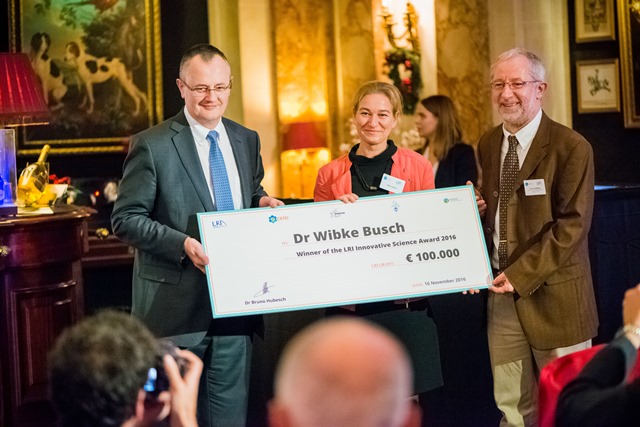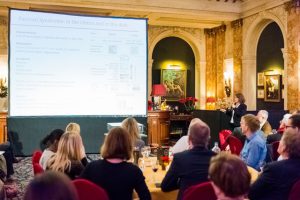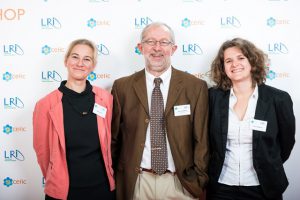Dr Wibke Busch was awarded the €100,000 LRI Innovative Science award 2016, one of Europe’s largest research grants for early career scientists, at the award ceremony of Cefic’s 18th Annual Long-Range Initiative (LRI) Workshop in Brussels on November 16, 2016.

Dr Nicolas Cudre-Mauroux, Solvay, Dr Wibke Busch, Awardee 2016, and Dr Bruno Hubesch, Long Range Research Initiative (LRI) Programme Consultant
The topic of the winning research proposal is “Genome wide profiling of molecular responses related to toxicokinetic and toxicodynamic processes for the determination of key events as basis for quantitative AOPs”. Applying state-of-the-art molecular, analytical, and data analyses methods, the proposed project will develop and test an experimental design to investigate the time- and concentration dependence of effect propagation by quantitatively linking toxicokinetics, toxicogenomics and phenotype observations.
“I really like how ecotoxicologists and human toxicologists come and work more and more together to tackle the challenges we have with all the chemicals out there”, mentioned Dr Busch.
The expected outcomes of Dr Busch’s project were also presented during the award ceremony, which are the following: enable to quantitatively link molecular effects with adverse outcome, identify key responses and key event sequences within AOPs, and provide an experimental approach for a systematic development of advanced predictive models, such as, toxicokinetic-toxicodynamic models or quantitative AOPs in the future.
During the Cefic-LRI Gala dinner, Dr Alice Limonciel, 2015 awardee, also presented some of the results of her project “Linking stress response pathways and markers of nephrotoxicity into renal adverse outcome pathways”. According to her studies, technological advances and increased knowledge of molecular pathways have created a paradigm shift in toxicology with the monitoring of molecular mechanisms as a driving force. Dr Limonciel’s project aims to identify the genes involved in cellular stress response pathways to quantify the activation and/or inhibition of these responses, in parallel with markers of cellular dysfunction to deliver a new generation of quantitative tools based on gene expression to evaluate the hazard linked to chemical exposure to be implemented into risk assessment strategies.
“The particular focus of this project is on the characterisation and quantification of these mechanisms in in vitro human renal cell cultures to be integrated into a novel adverse outcome pathway linking cellular responses to the acceleration of chronic kidney disease progression by chemicals”, highlighted Dr Limonciel.
Dr. Pierre Barthélemy, Cefic Executive Director of Research and Innovation, emphasized that “the LRI Award continues to build on excellent science and support top young scientists making another step in their career. If we look back at past awardees and their achievements, it is clear that the LRI Award has an excellent track record in identifying very promising scientists”. Dr Barthélemy also mentioned that “besides being a unique opportunity for researchers, the LRI Award represents another visible and important contribution of the LRI Programme and the Chemical industry in general to support science-based risk assessment of chemicals”.
Click here to see the video from the LRI Award Ceremony and Red Carpet Gala Dinner
About Dr Wibke Busch, LRI Innovative Science 2016 Awardee
Dr. Wibke Busch studied process engineering and biotechnology in Dresden and Jena (Germany) and was graduated as engineer for biotechnology in 2005. She received her PhD from the Martin Luther University Halle-Wittenberg in 2010 for her studies in the field of molecular nanotoxicology which she performed at the Helmholtz Centre for Environmental Research – UFZ in Leipzig (Germany) in the Department of Cell Toxicology. She received the SETAC GLB best PhD thesis award in 2011.
Since 2010, Dr Busch is working at the UFZ in the Dept. Bioanalytical Ecotoxicology where she established her own research group which is focused on the identification and understanding of mechanisms of toxic action of chemicals. Applying “omics” techniques as well as bioinformatics and modelling approaches she investigates molecular kinetic and dynamic processes and develops strategies for mode-of-action-based hazard assessment.
LRI Workshop pushes forward long-term research issues
The 18th edition of the Cefic-LRI Workshop focused on “AOPs and Genomics: how useful, how to address risk, and where next?”, and showcased the results of LRI projects completed in 2015-2016 in the areas of environmental methodology of mixtures and residues, grouping of nanomaterials dust and workers exposure, dermal absorption modelling, eye irritation alternatives, epidemiological evidence of ED, and epigenetics normality.
By fostering innovative research, the LRI programme implements critical initiatives that improve the information needed for science-based decision-making, building inter-disciplinary and international scientific networks, and engaging with partners around the world to link research to practice and policy.

















